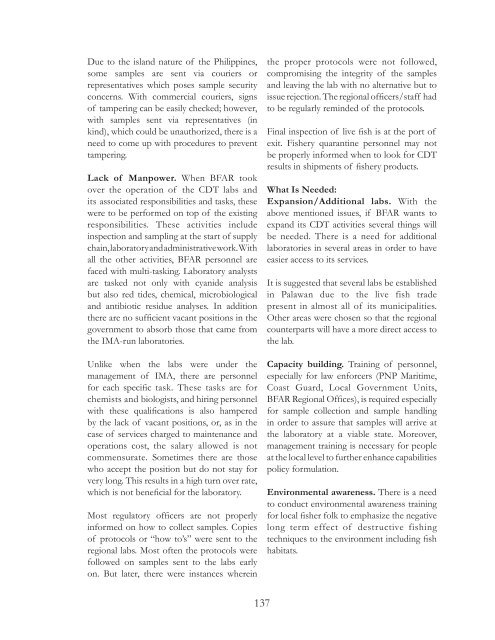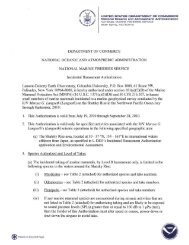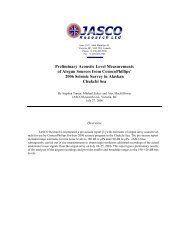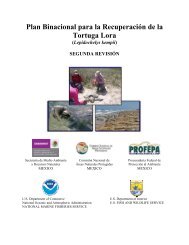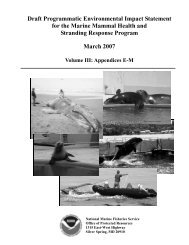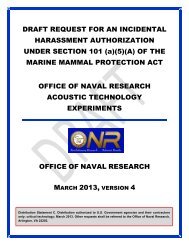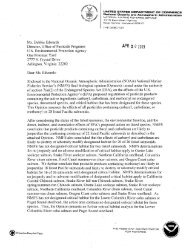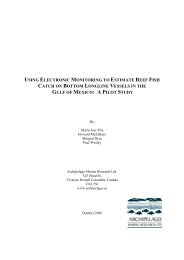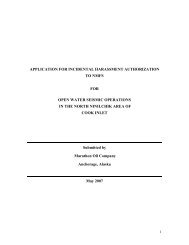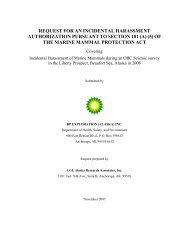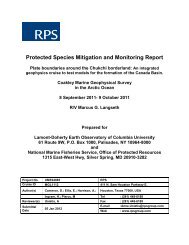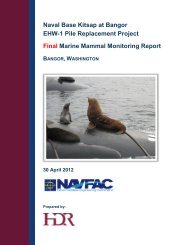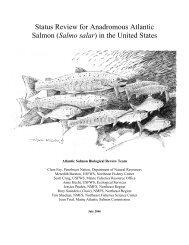Proceedings of the International Cyanide Detection Testing Workshop
Proceedings of the International Cyanide Detection Testing Workshop
Proceedings of the International Cyanide Detection Testing Workshop
Create successful ePaper yourself
Turn your PDF publications into a flip-book with our unique Google optimized e-Paper software.
Due to <strong>the</strong> island nature <strong>of</strong> <strong>the</strong> Philippines,<br />
some samples are sent via couriers or<br />
representatives which poses sample security<br />
concerns. With commercial couriers, signs<br />
<strong>of</strong> tampering can be easily checked; however,<br />
with samples sent via representatives (in<br />
kind), which could be unauthorized, <strong>the</strong>re is a<br />
need to come up with procedures to prevent<br />
tampering.<br />
Lack <strong>of</strong> Manpower. When BFAR took<br />
over <strong>the</strong> operation <strong>of</strong> <strong>the</strong> CDT labs and<br />
its associated responsibilities and tasks, <strong>the</strong>se<br />
were to be performed on top <strong>of</strong> <strong>the</strong> existing<br />
responsibilities. These activities include<br />
inspection and sampling at <strong>the</strong> start <strong>of</strong> supply<br />
chain, laboratory and administrative work. With<br />
all <strong>the</strong> o<strong>the</strong>r activities, BFAR personnel are<br />
faced with multi-tasking. Laboratory analysts<br />
are tasked not only with cyanide analysis<br />
but also red tides, chemical, microbiological<br />
and antibiotic residue analyses. In addition<br />
<strong>the</strong>re are no suffi cient vacant positions in <strong>the</strong><br />
government to absorb those that came from<br />
<strong>the</strong> IMA-run laboratories.<br />
Unlike when <strong>the</strong> labs were under <strong>the</strong><br />
management <strong>of</strong> IMA, <strong>the</strong>re are personnel<br />
for each specifi c task. These tasks are for<br />
chemists and biologists, and hiring personnel<br />
with <strong>the</strong>se qualifi cations is also hampered<br />
by <strong>the</strong> lack <strong>of</strong> vacant positions, or, as in <strong>the</strong><br />
case <strong>of</strong> services charged to maintenance and<br />
operations cost, <strong>the</strong> salary allowed is not<br />
commensurate. Sometimes <strong>the</strong>re are those<br />
who accept <strong>the</strong> position but do not stay for<br />
very long. This results in a high turn over rate,<br />
which is not benefi cial for <strong>the</strong> laboratory.<br />
Most regulatory <strong>of</strong>fi cers are not properly<br />
informed on how to collect samples. Copies<br />
<strong>of</strong> protocols or “how to’s” were sent to <strong>the</strong><br />
regional labs. Most <strong>of</strong>ten <strong>the</strong> protocols were<br />
followed on samples sent to <strong>the</strong> labs early<br />
on. But later, <strong>the</strong>re were instances wherein<br />
137<br />
<strong>the</strong> proper protocols were not followed,<br />
compromising <strong>the</strong> integrity <strong>of</strong> <strong>the</strong> samples<br />
and leaving <strong>the</strong> lab with no alternative but to<br />
issue rejection. The regional <strong>of</strong>fi cers/staff had<br />
to be regularly reminded <strong>of</strong> <strong>the</strong> protocols.<br />
Final inspection <strong>of</strong> live fi sh is at <strong>the</strong> port <strong>of</strong><br />
exit. Fishery quarantine personnel may not<br />
be properly informed when to look for CDT<br />
results in shipments <strong>of</strong> fi shery products.<br />
What Is Needed:<br />
Expansion/Additional labs. With <strong>the</strong><br />
above mentioned issues, if BFAR wants to<br />
expand its CDT activities several things will<br />
be needed. There is a need for additional<br />
laboratories in several areas in order to have<br />
easier access to its services.<br />
It is suggested that several labs be established<br />
in Palawan due to <strong>the</strong> live fish trade<br />
present in almost all <strong>of</strong> its municipalities.<br />
O<strong>the</strong>r areas were chosen so that <strong>the</strong> regional<br />
counterparts will have a more direct access to<br />
<strong>the</strong> lab.<br />
Capacity building. Training <strong>of</strong> personnel,<br />
especially for law enforcers (PNP Maritime,<br />
Coast Guard, Local Government Units,<br />
BFAR Regional Offi ces), is required especially<br />
for sample collection and sample handling<br />
in order to assure that samples will arrive at<br />
<strong>the</strong> laboratory at a viable state. Moreover,<br />
management training is necessary for people<br />
at <strong>the</strong> local level to fur<strong>the</strong>r enhance capabilities<br />
policy formulation.<br />
Environmental awareness. There is a need<br />
to conduct environmental awareness training<br />
for local fi sher folk to emphasize <strong>the</strong> negative<br />
long term effect <strong>of</strong> destructive fishing<br />
techniques to <strong>the</strong> environment including fi sh<br />
habitats.


